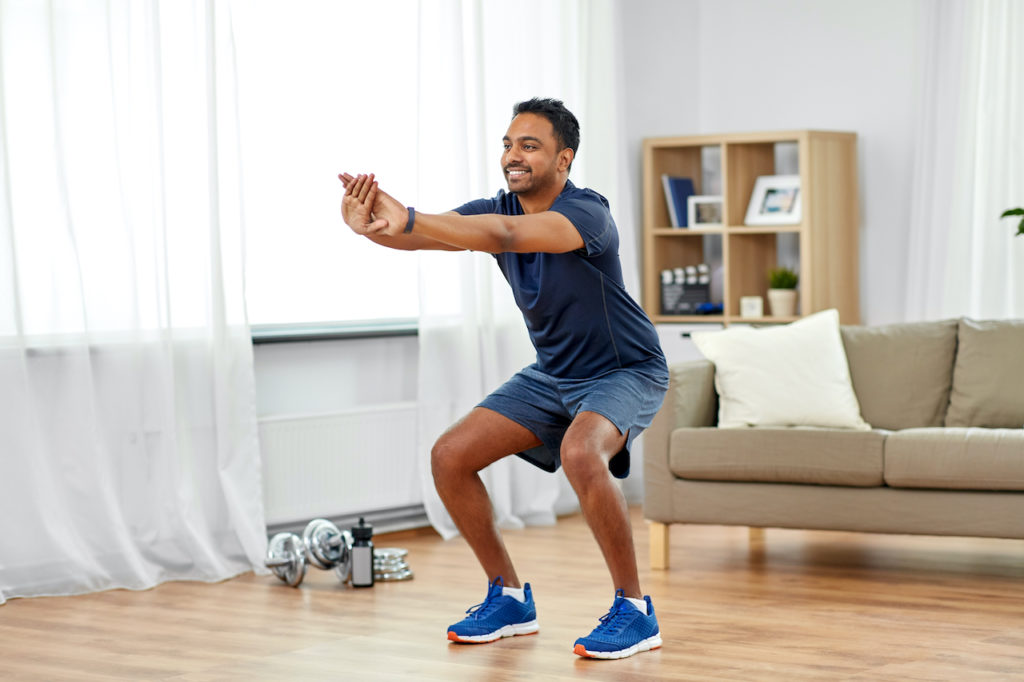By Dr. Jeffrey Gladden
As winter approaches, millions of Americans anticipate spending months trapped inside. The global pandemic has kept many of us indoors during the spring and summer. Now the weather had cooled, and our country faces a third spike in COVID-19 cases. Soon, we may face another period of quarantine.
Staying indoors can have a profound impact on our health. When stuck inside, it’s often difficult to remain active and stick to a healthy lifestyle. But the stakes have never been higher. Keeping fit boosts your immune system. It may help you reduce your risk of COVID-19. If you do become infected, you may face a much lower risk of complications.
Read on to learn more about staying healthy during this challenging time.
Manage your stress
The last several months have triggered unprecedented levels of stress. Most of my patients report feeling anxious, worried, and scared. Some are afraid of contracting COVID-19 or passing the virus to their loved ones. Others worry about economic challenges and financial pressure. These fears can become overpowering.
Keep in mind that stress weakens your immune system. Stress management is a vital part of staying healthy during a pandemic. If you’re struggling with negative emotions, consider the following tips:
Know thyself
Some people are genetically predisposed toward anxiety. These individuals tend to be especially fearful and vigilant. Being a “worrier” can also take a toll on your health.
If you’re a worrier, managing your stress involves fighting your own genetics. You may need to put added effort into your stress-management plan.
Make a game plan
Some of my patients report low levels of fear and anxiety, even during uncertain times. These individuals avoid stress because they feel that they’re “in charge” of their lives. They know they can take action to protect themselves.
If you’re struggling with anxiety, focus on the factors you can control. You can reduce your risk of infection by wearing a mask, washing your hands, social distancing, and maintaining a healthy lifestyle. Taking action helps you feel empowered rather than helpless.
Avoid the news
During a global pandemic, our bodies are in “fight or flight mode.” Our brains become hypervigilant. The constant stream of headline news can fan the flames of anxiety.
When patients report feeling anxious, I always suggest avoiding the news. Dedicating ten minutes to skimming the headlines each morning. If necessary, set a timer. Limit your exposure to the news to control your stress.
Clean up your diet
The stress of the pandemic has led many people to embrace unhealthy eating habits. Some may be using their free time to learn new cooking techniques. But others have developed a dependence on frozen foods and takeout. Nationwide, alcohol consumption has also spiked.
If you’re hoping to boost your immune system, avoid alcohol, processed foods, and refined sugar. They can trigger inflammation and poison your immune system. Alcohol can also slow your metabolism and lowers inhibitions. As a result, alcohol abuse can lead to high-risk behavior. Limiting alcohol strengthens and supports your immune system.
Consider supplements
Nutritional supplements may help ease stress, manage anxiety, and balance your hormones. If you’re thinking of trying a new supplement, consider the benefits of these:
- Magnesium – Soothes stress, controls inflammation, and fights depression
- Zinc – Boosts immune system and manages anxiety
- Ashwagandha – Calms stress and eases depression
- Diindolylmethane (DIM) – Balances hormones and helps fight weight gain
- Genistein – Balances hormones, especially in women
- Epigallocatechin gallate (EGCG) – Protects brain health and combats inflammation
Some supplements may interfere with prescription medications. Always talk to your medical provider before starting a new supplement.
Stay physically active
It isn’t easy to stay active during the winter months. But I encourage patients to get outdoors whenever possible. Research has found that COVID-19 transmission is less likely outdoors. When wearing a mask and socially-distancing, outdoor exercise is generally safe.
Getting outside helps you stay active and manage your stress. Aerobic exercise boosts the immune system and relieves symptoms of depression. It also helps patients manage their weight. COVID-19 takes a heavy toll on patients who are overweight or obese. These individuals are more likely to contract the virus. Unfortunately, they’re also more likely to experience severe complications.
If inclement weather keeps you indoors, consider fitness videos and bodyweight training. These activities are usually free, and you can perform them right in your living room.
There’s no doubt that we’re facing challenging times. But a positive mindset can make a difference. Stay informed, practice sensible precautions, and keep active!
